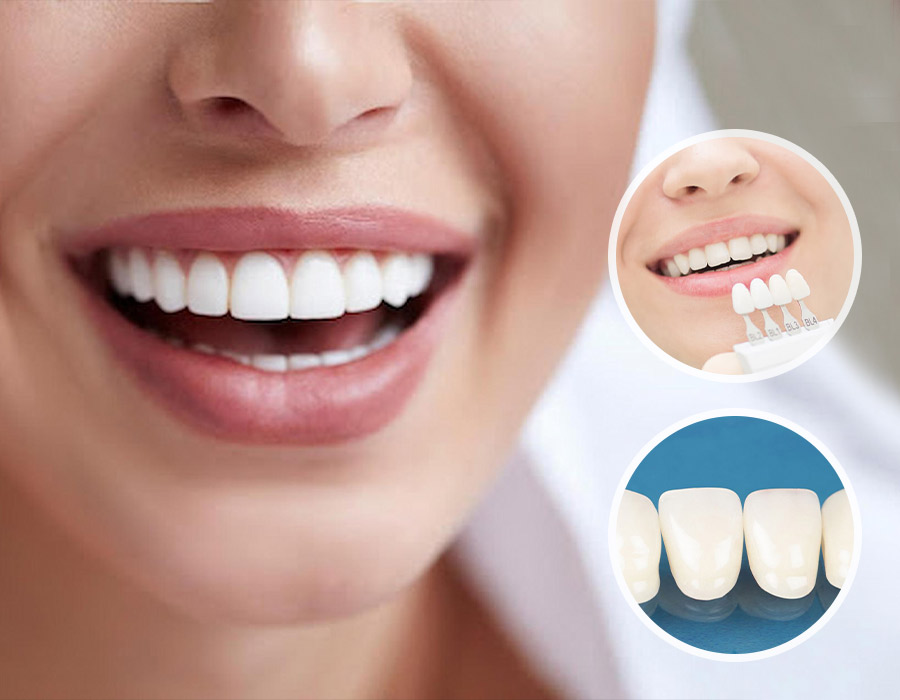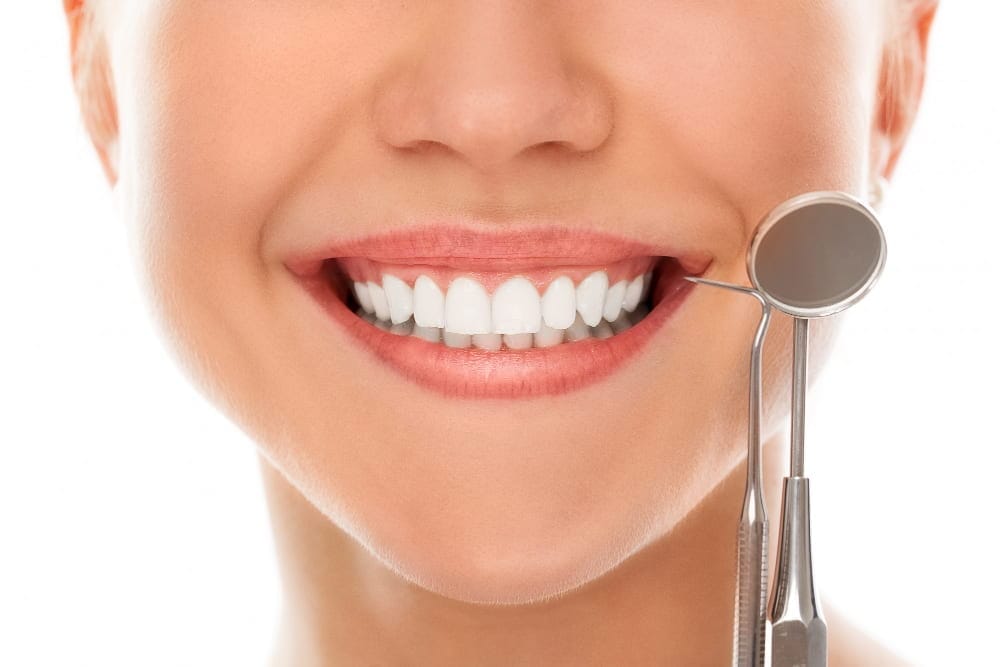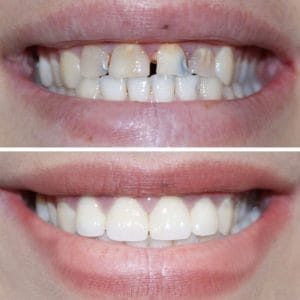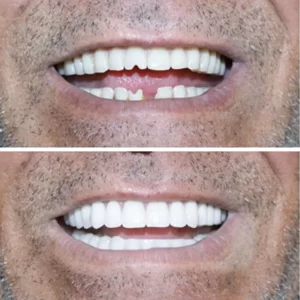
improve your smile
Dental Veeners in Antalya, Turkey
Dental veneers are a method used to solve many different dental problems such as uneven coloring, uneven gaps, or broken teeth. The procedure does not take long, and the veneering process is completed in a couple of appointments.
It is very easy to care for dental veneer, and it does not require any additional application. Composite, zirconium, porcelain, and E-max veneers are the types of dental veneers.
Since the patients are nervous and the procedure can be a little uncomfortable, a dental veneer is usually done by applying local anesthesia. Therefore, patients do not feel pain when the dentist removes a thin layer of tooth enamel.
What are Veeners?
Dental veneers are custom-made, very thin shells that cover the surface of your teeth to make your appearance better. They are made of tooth-colored materials. Dental veneers are attached to the front of the teeth, and they change the color, length, shape, and size of the natural teeth. Plus, dental veneers do not require additional care products. But you need to take care of them as you would do to your natural teeth.
Dental veneers aim to improve your look by removing problems related to tooth spacing, crooked teeth, and discolored teeth. It is possible to have a full mouth dental veneer or just a few teeth veneered. Veneers improve a person’s appearance; however, they are not a permanent cure. Here you should know that you need to renew your veneers on a regular period. They usually last 7-15 years.
Types of Veneers
Dental veneers, as a part of cosmetic dentistry, have various treatments for dental problems. Therefore, there are different types of teeth veneers to better respond to the needs of the patients.
Composite Veneers
Composite veneers are done by applying composite resin. It is a filling material with different tones of natural tooth color. So, composite resin can give teeth a lighter look. It is directly applied to the tooth.
Later, the dentist shapes and polishes it to give it an advanced appearance. If you are not satisfied with the result, your dentist can re-make it until you are happy with the result since it can be done in one appointment. Composite veneers last approximately 5-7 years and they cost cheaper than porcelain veneers.
Zirconium Veneers
Zirconium veneers are a type of ceramic material. Dentists usually prefer this type of veneer to make full or partial crowns if the patient has a broken or damaged tooth. Zirconia veneers can be in different tones to match your natural tooth color. It can give you confidence about your appearance and lasts for long years.
However, zirconium veneers waste away by time. A porcelain veneer is normally combined with zirconium to make it more enduring and appealing. They can be used after a porcelain veneering process to contribute to its resistance.
Porcelain Veneers
Porcelain veneers are the most preferred option among all the types of veneers. It can fix many dental problems such as discoloration, cracks, space problems between teeth, or worn enamel. They are as thin as a wafer. They are placed on the surface of the tooth and do not cover the whole tooth. Porcelain veneers are also a solution to tough cases, lasting about 10 years.
E-Max Dental Veneers
Emax veneers are a type of translucent lithium glass-ceramic dental veneers. They have a quite thin shape to overlap with the tooth. Emax veneer can help correct the color, remove the gap between teeth, and reshape teeth. It requires minimal tooth shaving, and they are the firmest dental coverings in the veneer market. Emax veneers last nearly 10-15 years if the patient has good dental hygiene.

Benefits of Dental Veneers
Dental veneers contribute to your physical appearance and help you improve your self-confidence. In addition to this, they have other advantages.
- Dental veneers have a quite natural appearance. They do not look different than natural teeth.
- Teeth coverings eliminate the problems you have related to your teeth. They help you get rid of tooth discoloration, chips and cracks, unwanted gaps between teeth, misalignments, and crooked teeth.
- Porcelain veneers are compatible with gum tissues. In addition, they do not give you discomfort after the procedure is completed.
- Stains cannot remain on porcelain veneers. Therefore, it is easy to take care of porcelain veneers, and they do not require any additional hygiene routine.
- Porcelain veneers make your teeth whiter if your teeth have a dark shade.
Veneering Process
There are generally 3 steps in the veneering process. The first step is for a consultation. And the next two steps include the process of making and applying the veneers to the teeth. You can have one tooth or more than one tooth getting done at the same time during the veneering process.

Diagnosis and Treatment Planning
The first step is prepping teeth for veneers. You need to explain the result you want to receive to your dentist and participate in the process actively. At the first appointment, the dentist examines your teeth and decides if the dental veneer is a good option for you.
He/she should decide and inform you about the procedure’s limitations and what it needs to include. During the examination, the dentist can examine your teeth to understand your mouth’s condition better.
Decides the Local anesthesia or Not
In the second step, first, your dentist decides if you need local anesthesia or not. Then, the dentist removes some enamel from the surface of your teeth, nearly the same amount as the thickness of the veneer. Removal of the enamel is needed to attach the dental veneers to your tooth. This amount is about 1-2 millimeters. In the last stage of this step, your dentist will create a model of your teeth and place temporary veneers.
Bonding
In the third step, the dentist temporarily places the model dental veneer on your teeth to check if it fits in terms of color and shape. He can trim the veneer if it does not fit well. Also, the color of the cement can help to adjust the tone of the color.
When the perfect fit is arranged, he cleans, polishes, and sculpts your teeth. Lastly, he places the permanent veneers on your teeth with special cement. And with the help of a light beam, the cement gets active and becomes tough.
Dental Veneers Before After Photos
How to Care for Teeth After Veneers?
Dental veneers do not require an additional care routine. However, you should take care of them as if they are your natural teeth. You should brush your teeth with fluoride toothpaste every day. It is important to make sure that you brush your teeth thoroughly for 2 minutes to prevent plaque buildup on your teeth and veneers. Sometimes brushing is not enough to prevent plaque. That is why you need to floss your teeth every day. Flossing helps maintain oral hygiene and cleaning.
Dentists recommend patients use fluoride mouth rinse on a daily basis. It will protect your mouth from plaque and food particles. If you do not know which label is good for you, you can ask your dentist for his recommendation. Also, it is recommended to have a comprehensive oral examination and professional teeth cleaning every 6 months.
Moreover, you should remember to limit the consumption of sweets. The cavity-causing acid produced by sweets prepares a convenient environment for plaques. That is why you need to limit sugary foods and beverages. In addition to sugar, you also have to be careful about eating too cold and chewing hard foods. For example, you should not chew ice and hard candies. They will harm your dental veneers.
FAQ of Dental Veeners
Do Dental Veneers Damage Your Teeth?
Dental veneers do not damage your teeth as long as you take well care of them. You are supposed to be careful about your mouth hygiene. Also, dental veneers will not harm your teeth if the necessary treatments are done before starting the procedure. For example, if you have decay, the dentist should treat it first.
To place the teeth coverings on your teeth, the dentist removes a thin layer of the enamel. This application might sound harmful to your teeth. However, your teeth under veneers are usually better protected because the teeth coverings behave like a shell on your teeth. Moreover, since the cement used to bond dental veneers is a special substance, it has no negative effects on your teeth.
Sometimes the dentist needs to apply treatment to your teeth before he starts the veneering process. Therefore, you need to be careful about his qualifications not to harm your teeth when you choose your dentist.
Are Veneers Painful?
Dental veneers require a reduction in the size of the tooth. And this application cause pain naturally. However, during the veneering process, the patient usually does not feel pain due to the impact of local anesthesia. In addition, the patient feels less nervous and anxious, and he feels more comfortable thanks to anesthesia. Therefore, it is a pain-free process. Most patients state that it is a comfortable process for them.
Nevertheless, the patient feels a little discomfort and pain when the anesthesia loses its impact. It is usually at a minimal level. Of course, as the number of processed teeth increases, the level of pain and discomfort increases too. However, this process can be managed using painkillers. In cases where there are broken teeth, root canal treatment, or removal of the tooth roots, the patient is expected to feel a little more uncomfortable.
What Do Dental Veneers Cost?
The cost of dental veneers varies since the process is tailored according to the patient. Also, the condition of your natural teeth, the type of veneer, the number of veneers you would like to have, and the number of specialists you need to visit during the process affect the cost. If the patient needs additional treatments, this can also increase the cost.
Composite veneers cost approximately between $250 and $1,500 per tooth. And lumineer veneers usually cost between about $800 and $2,000 per tooth. Again, therefore, the choice of the country and the clinic is important.
Click for current prices -> PriceList
In Turkey, veneers cost much cheaper than in many other countries, and this is a big advantage for you. You can have high-quality dental veneers at a much more reasonable price. Furthermore, Turkey offers the opportunity for experienced and successful dentists in the field of dental veneers. In addition, you can find many different opportunities in terms of tourism during this process.

Where is the Best Country to Get Veneers?
Dental veneers are at the top of the list that are requested the most dental treatments by the patients coming to Turkey all around the world. This high preference rate makes dentists and dental clinics in Turkey more experienced.
Dentists prefer the best dental technology in Turkey. They usually complete the treatment in two appointments. So, you can receive your high-quality veneers in a week without waiting for so long.
In particular, the opportunity to combine the treatment process with the opportunity of a vacation makes Turkey one of the most preferred countries. Especially Antalya attracts many patients due to the opportunity to enjoy great beaches, luxury hotels, and delicious foods.
Therefore, you can take pleasure in vacation during or after your veneering process.
Why are Veneers so cheap in Turkey?
Dental veneers are cheaper in Turkey because there is governmental support and facilitation for medical tourism.
In addition, other costs such as laboratory costs and dentist fees are much lower than in the US and the UK. High competition in the market also helps keep the prices low.
Since the cost of running a dental clinic is lower than the average in Europe, the full set of veneers cost is also nearly 30% lower in Turkey.
You can have a good-quality treatment at a cheaper cost than in your own country. You can also turn your treatment process into an enjoyable break by staying in luxury hotels and resorts in Antalya.
If you need dental veneers, Lara Smile Dental Clinic is always with you.



